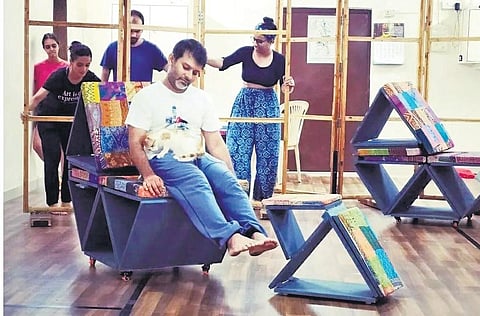

It was a romantic breakup that led to Faezeh Jalali having an epiphany. She wanted to not just perform in plays, but also write them. While dealing with heartbreak, writing gave her a sense of accomplishment she hadn’t been familiar with until then.
“I was in the UK after my relationship ended. There was a playwriting competition and I wrote a shabby draft. That is when it really began. I used to write poetry in my childhood. Then there was a big gap and then after my breakup, I started writing again,” recalls the Mumbai-based theatre artiste.
Jalali started as a theatre actor about two decades ago. Over the years, as she explored multiple elements of the art form, she also discovered that she enjoyed writing, directing and producing plays. The first play Jalali wrote was on the androgynous Shikhandi from the Mahabharata. It came out first as “one long poem”, and later, over the years, was transformed into a script that debuted on stage in 2016.
“If you had asked me in my twenties whether I would write, I would’ve said it’s too much work. But things change as you evolve. Right now, I am in a space where I don’t want to be on the stage too much. There are so many great actors and I would rather they did that work. I am enjoying the process of writing and directing a lot more now,” says Jalali, who has acted in adaptations of classics like
A Midsummer Night’s Dream, Arms and the Man and also a musical based on director Mira Nair’s Monsoon Wedding.
She is currently basking in the glory of the success of her latest work Strictly Unconventional, which premiered at Mumbai’s Prithvi Theatre earlier this month. A collection of plays about unconventional relationships, the production challenges, with wit and humour, accepted notions of normalcy in partnerships; in one story, two individuals of different sexual affinities discover happiness together. In another, a couple navigates the trials and tribulations of living with mental health issues.
“What interested me the least was relationships. I used to think that British and American plays were always about first-world problems like relationship issues, while it is us who have real problems,” she says. But then a few years ago, Gaysi, a Mumbai-based online publication for India’s queer community, asked her to write for their anniversary edition. “And, I wrote A Marriage of Convenience for them,” Jalali remembers. The early seeds for Strictly Unconventional were sown.
A Marriage of Convenience, which also features in Strictly Unconventional, concerns complications in the lives of a gay man married to a polyamorous woman, and both have a shared partner. “That play triggered a whole stream of thoughts on different kinds of non-traditional relationships that people choose to live in. And in doing so, you also ask yourself what exactly is unconventional. Each relationship is unique. Then do we say that one bond is conventional and the other is not?
I realised that I wanted to do many more such short pieces and make it into a play,” she says, adding that a lot of the pieces in the production started coming together during the lockdown in the last two years.
Like Strictly Unconventional, much of Jalali’s work centres around important contemporary issues as is evident in her social media posts, which reflect her thoughts on subjects like forest conservation and anti-CAA protests in the country. So do her plays.
A Farming Story written by Vineet Bhalla and directed by Jalali in 2018, is about India’s agrarian crisis. The bone of Contention in Cosmopolitan Cooperative Housing Society (both written and directed by her) is a farce on the current blame game epidemic. She also directed, a play based on the written accounts of Reyhaneh Jabbari, an Iranian woman who was incarcerated for murdering her rapist. “I want my theatre to be entertaining, but also have something that people can take back with them. Because of the person that I am, my politics and my understanding of the world, I often write about things that I feel strongly about. Even if I did not write A Farming Story, I wanted to direct it because it meant something to me,”
she says.
With her repertoire of over 30 productions across mediums, it is difficult to believe that acting was not Jalali’s first choice of profession. Even though her love for the performing arts can be traced back to her childhood when she would act out different scenes from everyday life with her siblings, Jalali studied to be an orthodontist. Until quite late, the theatre was a hobby.
Besides the stage, she has played prominent roles in films such as Slumdog Millionaire, Qissa and Phobia. In OTT, she featured in Hostages, A Suitable Boy and Eternally Confused and Eager for Love.
“As an actor, I have done all mediums, but theatre makes sense to me the most. Of course,
it doesn’t work for everyone, because it’s not always economically viable. But, on a creative level, it’s most satisfying for me,” Jalali admits, adding that she is currently working on scripts for three new plays––Kabar Klub, Shamshan Membership, Everything Hurts and Have You Read What’s in My Head.
For Jalali, theatre is a love for all seasons and reasons.